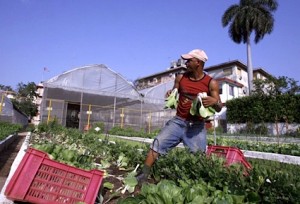 ‘Urban farming’ has been a key set of buzzwords in the latest fight for social justice throughout the United States. This movement is successfully revitalizing the health and economies of American cities, particularly those that have been characterized by blight, rising obesity, and other health-related challenges. With its growing popularity, who’s to say that urban farming can’t serve as a poverty-fighting tool in the developing world?
‘Urban farming’ has been a key set of buzzwords in the latest fight for social justice throughout the United States. This movement is successfully revitalizing the health and economies of American cities, particularly those that have been characterized by blight, rising obesity, and other health-related challenges. With its growing popularity, who’s to say that urban farming can’t serve as a poverty-fighting tool in the developing world?
Simply put, urban agriculture is just that – food, and sometimes even livestock, grown in a city environment. Low-income populations residing in food deserts – areas that do not have a grocery store within a mile radius – have been more likely to engage in this practice as a way of increasing their access to fresh produce. In addition to supplying healthier food options, urban farming has also been crucial in building a sense of community and bringing neighbors together around a common cause. While I am familiar with the concept of rooftop gardens, community gardens, and school-ran gardens, the idea of converting urban agriculture into a global business industry was a new one (this is an expressed goal of Hantz Farms in Detroit).
I was surprised to learn that the developing world is way ahead of the game in utilizing urban agriculture as a revitalization mechanism. Cuba, for example, was forced to enact urban farming in the 1990s when the fall of the Soviet Union, and a U.S. embargo, led to a collapse of its import and export markets (Cuba was importing at least 57% of its food). As a result, food security for its urban poor and revitalizing the national economy were seen as simultaneous goals and urban farming was aggressively pursued as the solution. The Department of Urban Agriculture was created to assist city dwellers with land acquisition, to serve as a resource for information, and to provide ongoing support for urban farmers. Today, Cuba’s 8,000 urban farms produce over 30,000 tons of the country’s fruits and vegetables.
Since urban farming has been changing the world for some time, my new question is, “Can the U.S. learn from urban farm movements in developing countries?” In Cuba, government played a crucial role in formalizing the urban agriculture sector. In countries like Venezuela though, the national government is looked upon with skepticism in this arena since there are challenges facing actual rural farmers that warrant more attention. I do not know that urban farming needs to be a federal agenda item for the U.S. However, local governments can learn from other countries in terms of how to officially incorporate urban farming in their plans for community and economic development.
Cities like Chicago have already taken the lead in establishing a zoning code that support urban agriculture. Other cities might look to establish policy guidelines that boost local economies, decreasing food transport costs, and strengthening the livelihood of inner-city populations. While urban farming alone will not eliminate urban poverty, it is certainly an interesting and innovative way to revive communities in the states and around the world.
Photo credit – An urban farm in Havana, Cuba


About The Author: Vanessa L.
More posts by Vanessa L.